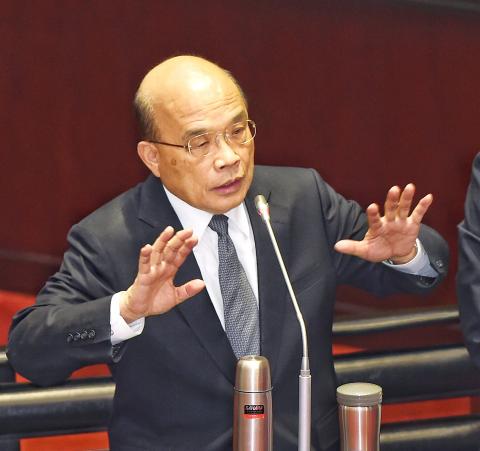Death sentences that have been handed to people in cases in which no further appeals are possible ought to be enforced, Premier Su Tseng-chang (蘇貞昌) said yesterday, adding that he “never protects bad guys.”
The premier made the remarks during an interpellation when Chinese Nationalist Party (KMT) Legislator Shen Chih-hwei (沈智慧) asked Su whether he would execute any of the 40 inmates on death row by the end of this year.
“Since the death penalty is stipulated in the law, it should be enforced where necessary. Even the two covenants [the International Covenant on Civil and Political Rights and the International Covenant on Economic, Social and Cultural Rights] say that the death penalty may be enforced in cases where it is unavoidable,” Su said.

Photo: Fang Pin-chao, Taipei Times
However, Shen said that since he took office more than eight months ago, not one death row inmate has been executed.
Su replied that the decision of whether to execute convicts lies with Minister of Justice Tsai Ching-hsiang (蔡清祥).
Tsai said that the government’s position on the death penalty is to gradually abolish it, and the ministry would carefully review each case when deliberating whether to enforce the death penalty.
Tsai’s response drew criticism from Shen, who said that the Democratic Progressive Party administration has been ambivalent on the matter and is “wasting taxpayers’ money feeding death row inmates” and “protecting bad guys instead of good guys.”
In response, Su said: “I never protect bad guys, nor have I given any orders to stop the execution of death row inmates.”
Shen then cited a driving under the influence (DUI) case in Taichung last year that involved a repeat offender who had been diagnosed with stage-four cancer.
Even though he killed two people while driving drunk, he would not receive a death sentence, Shen said.
She asked Su whether his remark that “drunk driving equals intentional murder” and that the government has “zero tolerance” for drunk driving still stands.
Su said that zero tolerance against drunk driving has always been his stance, adding that the Cabinet submitted proposals stiffen penalties for DUI in the Criminal Code and the Road Traffic Management and Penalty Act (道路交通管理處罰條例), which were passed by the Legislative Yuan.
However, Shen said the strictest punishment a repeat DUI offender can receive under those amendments is life imprisonment.

ACTION PLAN: Taiwan would expand procurement from the US and encourage more companies to invest in the US to deepen bilateral cooperation, Lai said The government would not impose reciprocal tariffs in retaliation against US levies, President William Lai (賴清德) said yesterday, as he announced five strategies to address the issue, including pledging to increase Taiwanese companies’ investments in the US. Lai has in the past few days met with administrative and national security officials, as well as representatives from various industries, to explore countermeasures after US President Donald Trump on Wednesday last week announced a 32 percent duty on Taiwanese imports. In a video released yesterday evening, Lai said that Taiwan would not retaliate against the US with higher tariffs and Taiwanese companies’ commitments to

‘SPECIAL CHANNEL’: Taipei’s most important tasks are to stabilize industries affected by Trump’s trade tariffs and keep negotiations with Washington open, a source said National Security Council Secretary-General Joseph Wu (吳釗燮) arrived in the US for talks with US President Donald Trump’s administration, a source familiar with the matter said on Friday. Wu was leading a delegation for a meeting known as the “special channel,” the Financial Times reported earlier. It marked Trump’s first use of the channel since returning to the White House on Jan. 20. Citing a source familiar with the matter, the Financial Times reported that Minister of Foreign Affairs Lin Chia-lung (林佳龍) was also a part of the delegation. The visit came days after China concluded war games around Taiwan and amid Trump’s

Intelligence agents have recorded 510,000 instances of “controversial information” being spread online by the Chinese Communist Party (CCP) so far this year, the National Security Bureau (NSB) said in a report yesterday, as it warned of artificial intelligence (AI) being employed to generate destabilizing misinformation. The bureau submitted a written report to the Legislative Yuan in preparation for National Security Bureau Director-General Tsai Ming-yen’s (蔡明彥) appearance before the Foreign Affairs and National Defense Committee today. The CCP has been using cognitive warfare to divide Taiwanese society by commenting on controversial issues such as Taiwan Semiconductor Manufacturing Co’s (TSMC, 台積電) investments in the

HELPING HAND: The steering committee of the National Stabilization Fund is expected to hold a meeting to discuss how and when to utilize the fund to help buffer the sell-off The TAIEX plunged 2,065.87 points, or 9.7 percent, to close at 19,232.35 yesterday, the highest single-day percentage loss on record, as investors braced for US President Donald Trump’s tariffs after an extended holiday weekend. Amid the pessimistic atmosphere, 945 listed companies led by large-cap stocks — including Taiwan Semiconductor Manufacturing Co (TSMC, 台積電), Hon Hai Precision Industry Co (鴻海精密) and Largan Precision Co (大立光) — fell by the daily maximum of 10 percent at the close, Taiwan Stock Exchange data showed. The number of listed companies ending limit-down set a new record, the exchange said. The TAIEX plunged by daily maxiumu in just